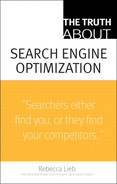Until just a few years ago, Google changed its ranking algorithm every month or so. The ranking algorithm is what many SEOs live and die by—it’s the complex, top-secret formula that determines how high (or low) a site or web page ranks in organic search results. Is yours the top result on the first page of results, or do you show up as result #24 on the third page?
After all, there’s being found, and there’s being found. The goal of search engine optimization is to rank high in search engine results for relevant queries. Although being #1 generally isn’t a realistic or a sustainable goal, you do want to appear on the first page or two of search results. Think of your own search behavior: How often do you venture all the way to page 10 of results for a given query, much less click on a result? Searchers are much more apt to refine their query, and then search and search again.
Although changes to search rankings today aren’t as episodic and abrupt as they once were, search engine indexes and rankings change all the time, as well they should.
Pages that no longer exist are dropped from the index. Newly found pages are added. Some pages drop in the rankings; others rise. Every search engine (not just Google) continually tweaks and refines its proprietary algorithms, causing entire websites, as well as individual pages, to almost continually rise and fall in the organic results rankings. Sometimes these changes are subtle; sometimes they’re dramatic. They can even be panic-inducing.
More than once, I’ve received frantic e-mail messages from a stressed-out “victim” of changes in search algorithms. Their site “disappeared” from Google or Yahoo!, or dropped down so far in the rankings that it might as well be invisible. “What should I do?” they implore. “How do I get back in? My entire business relies on getting organic search engine traffic!”
Therein lie two critical lessons (maybe we can even call them sub-truths), as follows:
• #1. Organic search engine traffic can be so valuable, it can sustain an entire business.
• #2. Organic search rankings are something you can work to influence, but ultimately you do not control them. The search engines’ algorithms make that call.
Both are important points to bear in mind regarding SEO. When it comes right down to it, there are no absolute guarantees any page will be listed for free on Google, or on any of the other major search engines.
SEO is a lot like public relations in that sense. You can talk to the media, carefully craft your messaging and delivery, send out press releases, and otherwise be present, ready, willing, and able to share information.
Maybe you’ll get media coverage, or maybe you won’t. Maybe your news will make page 1, or perhaps you’ll be buried in a squib on page 62. It’s simply not something that’s under your control. (Although a highly skilled media relations professional can greatly increase the odds of good placement.)
If you want a guarantee that your message will appear in a newspaper or a magazine the way you want it to and where you want it to be, buy an ad. The content and placement will be entirely under your control. The same is essentially true of search engines—the major ones all sell keyword-based advertising.
There’s an essential difference, however, between advertising and editorial, just as there’s a difference between appearing in paid search advertising versus the organic results generated by a search. Many companies find value in retaining both advertising and PR in their marketing arsenal. The same holds true when it comes to search.
Most site owners strive to appear in organic results for much the same reason businesses try to generate coverage in the media: It confers legitimacy and boosts sales. Searchers certainly click on the ads that appear in the right column next to organic results. (If they didn’t, Google wouldn’t be a multibillion dollar company; the company earns its money each time a user clicks on one of those ads.) However, the vast majority of users click on organic results, and express greater confidence in the relevance of those results. In surveys, some users claim to have never clicked on a search ad.
Businesses that pay to advertise on search engines also spend a great deal of time, attention, and money on search engine optimization. They understand this balance of trust and legitimacy. Paid search engine advertising may be a guarantee of placement, but organic results—while often varying in position within the results—can deliver as much (if not significantly more) value on the investment in SEO than the ads do on media spend.
If you’re planning to optimize your site for Google (or Yahoo!, or MSN, or Ask.com)—and if you have a website you want people to find, you should—prepare to do the Google dance. But be prepared for it, rather than let rises and falls in search engine fortunes send you into a tailspin.
Websites rise and fall in search engine rankings and results. They appear, and they even disappear. Sometimes it’s clear why this happens; sometimes the reasons are murkier. No search engine is ever going to let the public look under the hood to discover the deep inner secrets of how it really works. That would fling open the gates to abuse its systems, and everyone would lose.
At the end of the day, search engines reward sites with strong, relevant, fresh, frequently updated content, well-structured site architecture, and an intelligent link structure, with strong organic rankings.
Really, it’s as simple—and as difficult—as that.
